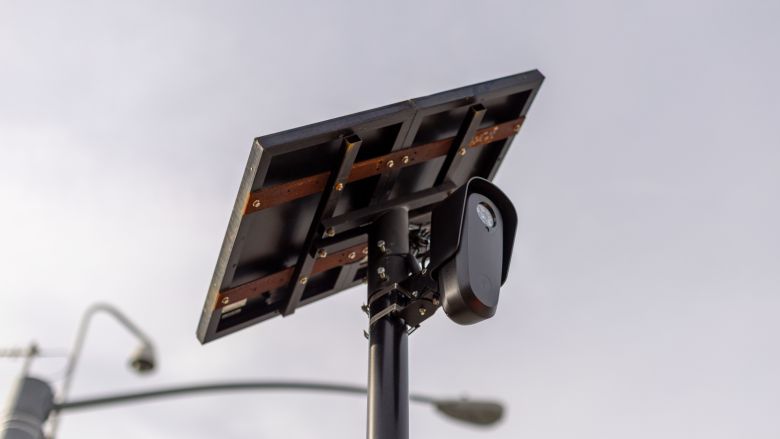Citing “grave Fourth Amendment concerns,” a national nonprofit law firm is pushing city officials in Greers Ferry to move a license-plate reading camera that is placed directly across from a resident’s house and captures anyone coming or going from the home.
According to the
Institute for Justice
(IJ), a libertarian-leaning Virginia-based law firm that has challenged the use of license-plate reading cameras in other states, the use of the camera violates the Fourth Amendment in multiple ways. Attorneys
are demanding
that Greers Ferry remove the camera immediately and terminate its contract with the camera provider when the initial contract expires this September.
In September 2024, Greers Ferry entered a contract with
Flock Group, Inc.
, a company that sells license-plate reading cameras that “capture vehicle details” and “provide searchable data” on the vehicles that are recorded. Pursuant to that contract, Flock installed five cameras in various locations around the Cleburne County hamlet. IJ says one of those cameras, installed in May, “was installed on Lone Pine Road South across the street” from the home of Charlie and Angie Wolf, a retired couple.
The day after the camera was installed, according to IJ, Charlie Wolf asked
Greers Ferry Police Chief Kallen Lacy
to reposition the camera because Wolf was concerned that it was pointed directly at his house. Lacy responded simply, “it’s not moving.”
A few weeks later, the Wolfs sent a letter to the
Greers Ferry City Council
expressing their objections and raising Fourth Amendment illegal-search concerns. On July 8, Charlie appeared at
a city council meeting
to reiterate these concerns. In response, city attorney
Blake Spears
said, “If you want the camera moved, my suggestion would be to get a court order.” Chief Lacy added, “We have no plans to move the camera.”
At that point, the Institute for Justice got involved. On Thursday, the firm sent a letter to Greers Ferry city officials, explaining the Fourth Amendment issues that the cameras raise generally, as well as concerns specific to the Wolfs. They specifically noted that courts have held the Fourth Amendment must provide “at least as much privacy as Americans would have enjoyed when it was adopted.” Because these cameras did not exist in 1791, IJ says, the use of such cameras to record people’s movements without a reasonable suspicion of any wrongdoing violates the Constitution.
These cameras essentially mean “the citizens … live under the watch of a web of ‘unblinking eyes,’” IJ’s letter says, “and reasonably people do not expect to be spied on in that manner as they go about their daily lives.”
Using Flock cameras to create this kind of constant surveillance state, they add, has been struck down by the supreme courts of Colorado and South Dakota in recent years, and a federal court in Virginia recently denied the city of Norfolk’s motion to dismiss a lawsuit brought by IJ over the use of Flock cameras in that city as well.
IJ says Greers Ferry must remove the camera from in front of the Wolf’s house immediately and not renew the contract with Flock when it expires. Failure to do so “may expose the City to litigation.”
Flock has faced increasing public scrutiny in recent months for facilitating local police departments’ sharing of camera information with federal Immigration & Customs Enforcement officials.
According to a recent report from 404 Media
, Flock data shows “more than 4,000 nation and statewide lookups by local and state police done either at the behest of the federal government or as an ‘informal’ favor to federal law enforcement, or with a potential immigration focus.”
“While Flock does not have a contract with ICE, the agency sources data from Flock’s cameras by making requests to local law enforcement,” the report says.
At least one state — California — explicitly prohibits police from sharing this kind of data with federal agencies,
but that has not stopped cities like Oakland and San Francisco from doing exactly that
.
In Arkansas, the state Legislature passed a new law earlier this year to expand who can use plate-reading cameras and what that information can be used for.
Act 668
, sponsored by
Sen. Ben Gilmore
(R-Crossett) and
Rep. Jimmy Gazaway
(R-Paragould), allows private land owners and “commercial businesses” to install license-plate-reading cameras on their property. Previously, only government-affiliated agencies were allowed to utilize this technology.
Act 668 also removed a prohibition against using or sharing information gathered by plate-reading cameras “for any other purpose,” meaning both state and local officials as well as private individuals and companies in Arkansas could freely share this data with ICE and other federal agencies. The law still mandates that data be purged after 60 days by private land owners and businesses and after 150 days by all other entities.
It’s dragon-slaying time!
In a time when critical voices are increasingly silenced, the
Arkansas Times
stands as a beacon of truth, tirelessly defending the fundamental rights and freedoms within our community. With Arkansas at the epicenter of a sweeping culture war affecting our libraries, schools, and public discourse, our mission to deliver unflinching journalism has never been more vital. We’re here to “slay dragons” and hold power accountable, but we can’t do it alone. By contributing today, you ensure that independent journalism not only survives but thrives in Arkansas. Together, we can make a difference — join the fight.







